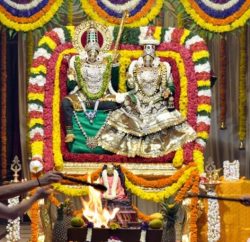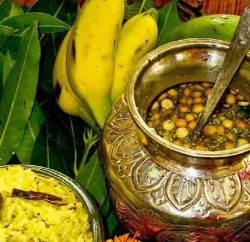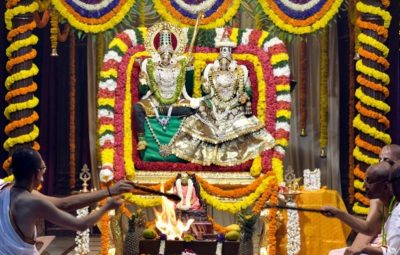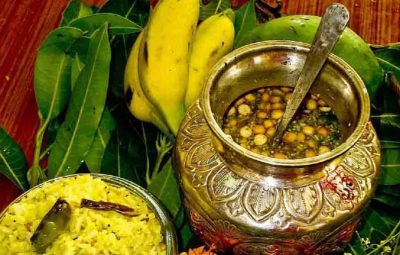On the auspicious occasion of Srila Bhaktivinoda Thakura’s appearance day, let us learn about his exemplary and inspiring life.
Table of Contents
- 1 Early Life and Divine Mission
- 2 The Decline of Dharma
- 3 Reviving Lord Chaitanya’s Teachings
- 4 The Thakura’s Writings Stand the Test of Time
- 5 Illustrious Son – The Lion Guru
- 6 Punishing a Bogus Incarnation
- 7 Glorious Qualities of a Vaishnava
- 8 Pranama Mantra of Srila Bhaktivinoda Thakura
- 9 Following in the Footsteps of the Acharya
Early Life and Divine Mission
Srila Bhaktivinoda Thakura was born on 2 September 1838 at Birnagar (then called Ulagram) in the Nadia district of West Bengal. He was the third son of Ananda Chandra Datta and Jagat Mohini Devi. He was named Kedarnatha Datta.
In the Bhagavad-gita (4.7-8, 4.34), Lord Krishna declares that He will incarnate personally and send His pure representatives whenever religious practices decline or discrepancies occur to protect the innocent, punish the guilty, and reestablish real religious principles.
Srila Bhaktivinoda Thakura is one such great acharya sent by the Lord in the Brahma-Madhva-Gaudiya sampradaya. He is also the father and grand spiritual master of Srila Bhaktisiddhanta Sarasvati Maharaja (Srila Prabhupada’s spiritual master).
The Decline of Dharma
During Srila Bhaktivinoda Thakura’s time, the pristine teachings of Lord Chaitanya were diluted to such an extent by various imposters that people considered all His followers to be parasitic beggars in society. Amidst this spiritual vacuum, Srila Bhaktivinoda Thakura reshaped public opinion with his intense efforts by writing, publishing, preaching the message of Lord Chaitanya and also through his personal character and behaviour.
Srila Bhaktivinoda Thakura’s guru, Srila Jagannatha Dasa Babaji Maharaja, also saw this degradation. He lived in Navadvip, the birthplace of Lord Chaitanya, as a solitary sadhu engaged in Harinama bhajan. He preferred seclusion and anonymity, as most people were not interested in rendering service to Krishna; they wanted to satisfy their material desires.
Reviving Lord Chaitanya’s Teachings
Around five hundred years ago, Sri Chaitanya Mahaprabhu had declared:
pṛthivīte āche yata nagarādi grāma
sarvatra pracāra haibe mora nāma
In every town, city, and village of the world, the Krishna consciousness movement will be preached.
The Thakura took this message to heart. Despite his responsibilities as a householder with ten children, duties as a magistrate, and superintendent at the Jagannatha Puri temple, he:
- Authored and printed approximately 100 books, devotional songs, and magazines.
- Rediscovered Lord Chaitanya’s birthplace and built a temple there
- Organised Harinama Sankirtana programs.
- Installed Deities at the various holy places connected with Lord Chaitanya.
- Taught Srimad-Bhagavatam classes to create awareness and revive Lord Chaitanya’s pure message of Krishna-bhakti in India personally and worldwide through his writings.
His efforts and pure character convinced the global intelligentsia of the authenticity of Lord Chaitanya’s message during his time. British officers would fight over him for their area because of his extreme efficiency.
His strict daily schedule was as follows:
- 8 p.m.-10 p.m. Rest (2 hours)
- 10 p.m.-4 a.m. Write books (using an oil lamp for light as there was no electricity)
- 4 a.m.-4:30 a.m. Rest
- 4:30 a.m.-7 a.m. Chant Japa
- 7 a.m.-7:30 a.m. Answer letters
- 7:30 a.m.-9:30 a.m. Study scriptures and receive visitors
- 9:30 a.m.-10 a.m. Bath, prasadam (half-litre milk, fruit, two chapatis)
- 10 a.m.-1 p.m. Court Duties (He would go with a shaven head, Tulasi neck beads and Tilak on the forehead. He would finish 30-50 cases. He would take only 5 minutes per case and take 2 minutes to write his judgement while others would take half an hour to forty-five minutes per case)
- 1 p.m.-2 p.m. Refresh at home
- 2 p.m.-5 p.m. Court Duties
- 5 p.m.-7 p.m. Translate Sanskrit scriptures to Bengali
- 7 p.m.-8 p.m. Bath, prasadam (half-litre milk, rice, two chapatis)
Srila Bhaktivinoda Thakura’s dedication and efforts to spread the teachings of Lord Chaitanya, the devotee incarnation of Lord Krishna, earned him the title of the ‘Seventh Gosvami’ after the six Gosvamis of Vrindavan from great literary men of his time.
As we reflect on Srila Bhaktivinoda Thakura’s disciplined daily schedule, we are reminded of the importance of time management in our own spiritual practices.
The Thakura’s Writings Stand the Test of Time
In 1969, when Srila Prabhupada was visiting Montreal, Canada, one of his disciples found a copy of the English book, “Chaitanya Mahaprabhu – His Life and Precepts” written and sent by Srila Bhaktivinoda Thakura to Montreal’s McGill University in 1896.
He was delighted to see this. Although not biologically connected to Srila Bhaktivinoda Thakura, he was spiritually connected through the guru parampara or disciplic succession stemming from Lord Krishna.
Lord Krishna revealed this spiritual basis for universal brotherhood in the Bhagavad-gita (14.4, 15.7). Krishna is the Supreme Father, and we are His eternal parts and parcels as spirit souls.
Illustrious Son – The Lion Guru
To continue the disciplic succession, Srila Bhaktivinoda Thakura prayed for a child who would be a ray of Lord Vishnu to assist him in his preaching efforts, just as Kardama Muni did as an ideal householder. Srila Bhaktisiddhanta Sarasvati Thakura was born as the result of this prayer. He was named Bimala Prasada Datta.
Srila Bhaktisiddhanta Sarasvati Thakura was a scholarly person known for his bold and fierce preaching of Lord Chaitanya’s teachings throughout India.
Srila Bhaktivinoda Thakura asked him to take initiation from Srila Gaura Kishora Dasa Babaji Maharaja, an illiterate person in the worldly sense but was a pure devotee of Lord Krishna, capable of explaining any intricate point related to devotional service with Vedic references.
Srila Bhaktisiddhanta Sarasvati Thakura was a lifelong celibate, wrote and published extensively and established the Gaudiya Math, a Vedic institution to spread Lord Chaitanya’s teachings all over India. The Gaudiya Math went onto have 64 branches during Srila Bhaktisiddhanta Thakura’s time. He also sent some disciples abroad to western nations with the intention of broadcasting Lord Chaitanya’s message to the global audience.
Punishing a Bogus Incarnation
Sri Chaitanya Mahaprabhu is the hidden incarnation of Lord Krishna as a devotee in Kali-yuga (Srimad-Bhagavatam 7.9.38). Whenever someone addressed Him or any ordinary person as the Supreme Lord, Bhagavan, He would close His ears with His hands and chant the holy name of Lord Vishnu to indicate to them that this is an offence. He keeps His original identity hidden, because He knows that many ordinary people will claim to be Bhagavan (God) without the qualities of Bhagavan.
During Srila Bhaktivinoda Thakura’s time, a person named Bisakisen was doing just that. There were some complaints against him, and Srila Bhaktivinoda Thakura arrested him. He had some mystic powers and used black magic to make Srila Bhaktivinoda Thakura and his family fall sick with high fever.
Unshaken and determined to bring him to justice at any cost, he asked some barbers to cut off Bisakisen’s hair as he knew some yogis stored their power there. The barbers were scared that they too might be cursed. So the Thakura himself cut off Bisakisen’s hair. Bisakisen immediately lost his power and fell unconscious. After being put in jail, Bisakisen consumed poison and died.
He would also arrest thieves who were harassing pilgrims at holy places. Although he was such an exalted personality, he was always humble and eager to assist any sincere devotee of the Lord. The Chaitanya-charitamrita, the biography of Sri Chaitanya Mahaprabhu written by another great acharya, Srila Krishnadasa Kaviraja Gosvami, lists twenty-six transcendental qualities of a pure devotee:
(1) He is very kind to everyone.
(2) He does not make anyone his enemy.
(3) He is truthful.
(4) He is equal to everyone.
(5) No one can find any fault in him.
(6) He is magnanimous.
(7) He is mild.
(8) He is always clean.
(9) He is without possessions.
(10) He works for everyone’s benefit.
(11) He is very peaceful.
12) He is always surrendered to Krishna.
(13) He has no material desires.
(14) He is very meek.
(15) He is steady.
(16) He controls his senses.
(17) He does not eat more than required.
(18) He is not influenced by the Lord’s illusory energy.
(19) He offers respect to everyone.
(20) He does not desire any respect for himself.
(21) He is very grave.
(22) He is merciful.
(23) He is friendly.
(24) He is poetic.
(25) He is expert.
(26) He is silent.
All of these were found in Srila Bhaktivinoda Thakura. His life inspires generations to come, irrespective of background, to lead a purposeful life in the service of the Almighty. Srila Bhaktivinoda Thakura, in his own words, wrote about the nature of a pure Vaishnava as follows:
“He reasons ill who tells that Vaishnavas die, when thou art living still in sound! The Vaishnavas die to live, and living try to spread the holy name around!”
Pranama Mantra of Srila Bhaktivinoda Thakura
Let us pray to him on his appearance day for his mercy to progress in devotional service by chanting his pranama mantra:
namo bhaktivinodāya sac-cid-ānanda-nāmine
gaura-śakti-svarūpāya rūpānuga-varāya te
I offer my respectful obeisances unto Saccidananda Bhaktivinoda, who is the transcendental energy of Lord Chaitanya Mahaprabhu. He is a strict follower of the Gosvamis, headed by Srila Rupa Goswami.
Following in the Footsteps of the Acharya
Let us also take inspiration from his divine life by trying to increase our efforts and sincerity in following the instructions of the current link in the disciplic succession, Srila Prabhupada, including:
- Chanting the Hare Krishna mantra everyday attentively at least 16 rounds without fail (If you’re new to this practice, start with one round and gradually increase the number as you become more comfortable)
- Following the four regulative principles of no meat eating, no illicit sex, no intoxication (even tea, coffee) and no gambling.
(These practices might seem challenging initially, but with sincere chanting, prayer, and determination, you can steadily reach the standard. Start where you are, and do your best. Spiritual progress will follow as we experience a higher taste) - Offering our time and resources to the service of the Lord
By doing so, we can fulfil the purpose of life: reestablishing our forgotten eternal loving relationship with Krishna.










